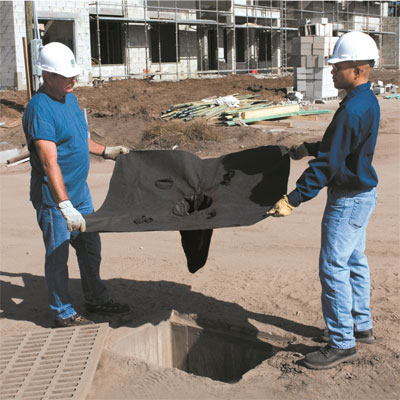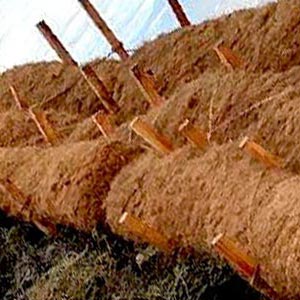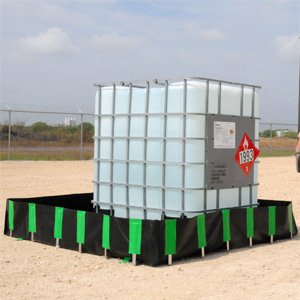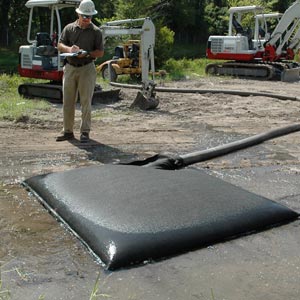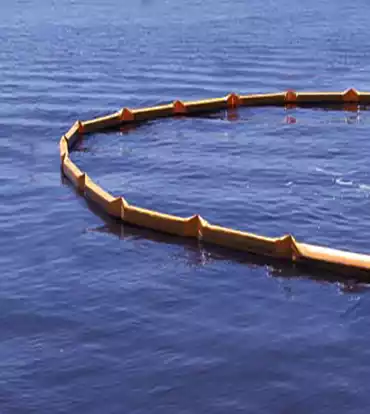
Heavy Duty Silt Barrier
Type 2 For Shoreline Construction
Use Heavy Duty Type 2 Silt Barrier in moderate current or tides to keep your project in compliance with EPA regulations. This heavy duty grade of floating silt barrier is used to contain sediment-filled waters from dredging activities, pile driving, and shoreline construction.
Our friendly staff is here to help you get the exact product you need!
Call Us! 1-863-261-8388or Contact us for additional information.
HD Type 2 Silt Barrier Features
- 5/16" Bottom Ballast Chain
- Impermeable or Permeable Models
- Marine Grade Universal Section Connectors
HD Type 2 Silt Barrier Benefits
- Custom options available
- Manufactured in the USA
- Meets local and state regulations
HD Type 2 Silt Barrier Details
HD Type 2 Silt Barriers are recommended for use in areas with currents up to 1 knot, waves up to two feet, or sites subject to moderate winds. HD Type 2 turbidity barriers feature a strong bottom ballast, high strength top tension cables and a universal bulk connector. Silt curtains keep water-based construction areas in compliance with clean water regulations by containing the sediment filled water until the silt settles again to the bottom. By creating a mini-environment where the sediment has a longer time to settle, TSS (total suspended solids) levels are reduced to fit compliance requirements. Type 2 HD Silt Barriers are available in both impermeable and permeable models depending on the requirements of your location. Both impermeable and permeable models depending on the requirements of your location.
- Silt barrier section lengths* 50 ft. or 100 ft.
- Panel depth is customized to fit your project
Additional Type 2 Silt Barrier Models
- Type 2 Contractor (13 oz. PVC, 4" Floats)
- Type 2 DOT (18 oz. PVC, 6" or 8" Floats)
Additional Products for Anchoring and Installation
Using these marine accessories will help with protecting your floting silt barrie during installation and to avoid common installation errors that could cause your project to drop out of compliance. Please ask us for assistance if you have questions.
- Anchor kits: anchor, painter rope, buoy, chain
- Tow bridle: helps distribute the load and minimize tow-stress
- Reefing lines: provides greater control over the curtain depth for each panel, post installation
- Tidal compensator: automatically adjusts the silt barrier to fit the changing water depths from the tides.
Realizing that not all water locations will fall into these parameters, we also offer floating silt curtains in two other models: Type 1 Silt Barriers (calm water) and Type 3 Silt Barriers (offshore/demanding water).
HD Type 2 Silt Barrier Specifications
| Standard Length | 50' or 100' |
|---|---|
| Flotation | 6" Float 8" Float 12" Float |
| Fabric | 22 oz. PVC |
| Fabric | 18 oz. PVC |
| Top Section Connectors | Universal Slide Bulk Connectors |
| Skirt Connectors | Grommets |
| Bottom Connectors | Bottom Stress Plates |
| Tension Cables | 5/16" Top Tension Cable |
| Bottom Chain | 5/16" Steel Ballast Chain |
| *Custom Sizes and Hardware Available |
Type 2 HD Permeable Turbidity Curtain Specifications
| Length | 50 or 100 ft. |
|---|---|
| Flotation | 6" Float 8" Float 12" Float |
| Fabric | 22 oz. PVC w/ 6 oz. Monofilament |
| Top Section Connectors | Universal Slide Bulk Connectors |
| Skirt Connectors | Grommets |
| Bottom Connectors | Bottom Stress Plates |
| Tension Cable | 5/16" Top Tension Cable |
| Bottom Chain | 5/16" Steel Ballast Chain |
| *Custom Sizes and Hardware Available |
Note for All Salt Water Areas: Anytime you are implementing a Floating Silt Barrier in salt water oceans or lagoons, it is recommended that your barrier feature Stainless Steel Cables and Zinc Anode Components. These components offer a higher resistance to corrosion, common with extended saltwater use. Dealing with a Short-Term Project? Working with a tight project budget? Standard galvanized components will work in saltwater areas for a period up to 12 months.
HD Type 2 Silt Curtain Applications
Type 2 Silt Barriers are great for controlling silt in range of conditions with moving water. Some of the most common uses include the following:
- Dredging Operations
- Construction Projects
- Marine Projects
- River Bank Erosion Silt Control
- Great Lakes Construction Projects
- Restoration Projects
- Dredging in a River
- Turbidity Curtain for Rivers
- Floating Silt Barrier Height
- Silt Control Barrier for Pile Driving
- Silt Barriers Protect Wetlands During Drilling
The economical and reliable design of the barriers has made them a favorite for use in marine containment and protection applications. Advantages to using these curtains include the following:
- Protection of Aquatic Habitats (Sea Grass Beds, Aquaculture Facilities, Spawning Areas)
- Reduction of Silt Settling Times
- Compliance with Local & Federal Regulations (including DOT regulations, Federal Clean Water Act, Environmental Protection Agency (EPA), NPDES Phase II Regulations
- Avoidance of Fines and Project Shutdowns
HD Type 2 Silt Barrier Frequently Asked Questions
Determining the right depth depends mostly on the specific water depth in your location. It is typically recommended that the bottom skirt of your curtain hang down at a length that will allow the barrier to sit about One Foot from the Floor. This means that all depths will be chosen based on location.
Most turbidity barriers feature an impermeable fabric that retains sediment and silt to a dredging or construction site location. However, in certain instances, having water flow through the curtain can help maximize the efficiency of your project. For these locations, permeable monofilament fabrics are placed within the bottom skirt. These filter fabrics keep sediment contained, while still allowing water to flow through the Floating Silt Curtain. Permeable models are most commonly added to the Type 2 and Type 3 Barriers.

